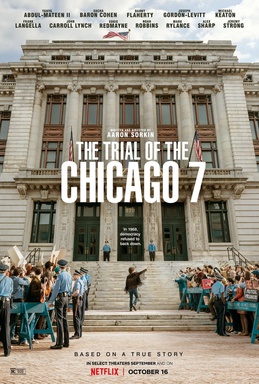First off, this is a movie written and directed by Aaron Sorkin. If you’ve ever seen anything by Aaron Sorkin, you already know what to expect. Though I must admit, the dialogue wasn’t as Sorkinian as I had been led to believe by critical hot takes on Twitter. The man is an auteur for sure, but I never felt myself taken out of the movie during a dialogue-heavy scene, which is a feeling I have definitely had when watching other Sorkin works. Instead, there was the climactic courtroom scene at the end, the kind with swelling musical overtures, where people start to stand up and cheer in support of the underdog, and THAT was peak Sorkin. He is absolutely not subtle. But given the sheer number of characters and the denseness of this plot, it all works out. By the time you get to that climactic moment, you’re ready to sink in and wallow in the sentiment for a bit.
This movie recounts the trial of eight men who were accused by the United States government of inciting riots in Chicago during the 1968 Democratic National Convention. At the time of the riots, Lyndon B. Johnson was President, but at the time of trial in 1969, Richard Nixon had taken over, and the new Attorney General, John N. Mitchell, was eager to prosecute these men who had led thousands of people to Chicago to protest the Vietnam War. These men included Tom Hayden (Eddie Redmayne), Abbie Hoffman (Sacha Baron Cohen), Jerry Rubin (Jeremy Strong), David Dellinger (John Carroll Lynch), and Bobby Seale (Yahya Abdul-Mateen II), the co-founder of the Black Panthers, who was only in Chicago for a few hours for a speech and had absolutely nothing to do with the protests and riots (a fact that becomes increasingly relevant and insane as the trial wears on). If you can count, I've obviously not listed out all the men involved, but those actors don’t do too much in this film because we already have plenty to be getting on with. The lawyer representing these men was William Kunstler (Mark Rylance, sporting the worst haircut known to man), while the US attorney prosecuting the case was Richard Schultz (Joseph Gordon-Levitt). And the judge presiding over these shenanigans was Julius Hoffman (Frank Langella), who acts in ways that are increasingly more horrifying and border on cartoonish until you read up on the actual trial and discover that Sorkin didn’t even have to make this shit up.
Look back at that cast. What a wonder it is. Every single actor is a powerhouse in his own right, and in this movie, we get this magical ensemble that is simply on fire. Of course, this is a very male magical ensemble that absolutely does not pass the Bechdel test, and in typical Sorkin fashion, the few female characters exist to relate to these men in the most stereotypical ways possible. So let's roll our eyes and move on. I must take a moment to acknowledge Redmayne and Rylance for their wonderful American accents, and then shake my head over Cohen, whose Boston accent feels like it consisted of him just practicing the phrase “I parked my car in Harvard Yard” over and over again. Accent aside, though, I found myself quite moved by Cohen’s performance in the end and couldn't help cheering a little when he gave his testimony. After all, courtroom drama is the best drama.
The true star of this film is Sorkin’s screenplay; he introduces this sprawling cast of characters and then hones in on their personalities so you don’t completely lose the plot. There’s the classic use of flashbacks to go back and forth from the riots in the past to the present-day courtroom scenes, so nothing ever stagnates and your attention never flags. And while each character seems to be wedged into a box, e.g. the free-thinking hippies versus the strait-laced and earnest Democrat, we manage to see them develop over two hours and surprise each other. None of these people have identical political philosophies but they are all united in their belief that the Vietnam War is unjust. While this trial is a political sham designed to falsely convict these men of working together to incite violence, it manages to actually bring them together and give them a chance to peacefully protest in the courtroom.
I knew absolutely nothing about these men and this trial, which is an excellent way to go into this movie. Just let history unfold for you and gasp at all the shocking perversions of justice and racism and political chicanery. All of this happened in 1969, but it doesn’t feel remotely out of place in 2020 when the current US Attorney General seems similarly inclined to pursue political vendettas instead of protecting free speech and seeking actual justice for American citizens. That’s the most difficult aspect of watching this movie. It is well-directed, impeccably written, and beautifully acted, but at no point could I just lose myself in it, because so much of it felt like some historical artifact that we should have learned from and moved on from, but haven’t. So watch The Trial of the Chicago 7 and appreciate it for the sheer technical artistry that went into putting this complex and compelling story together. But be prepared for it to sting a little.

No comments:
Post a Comment